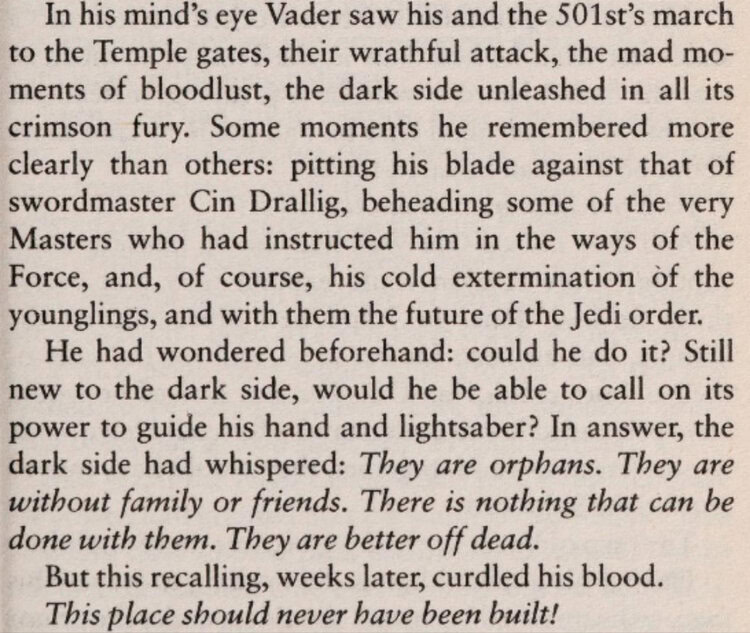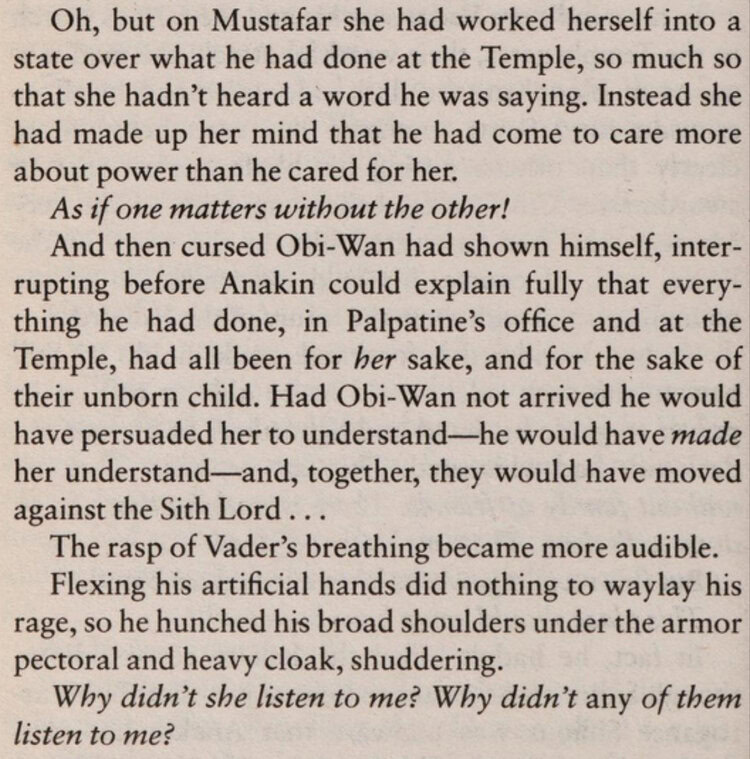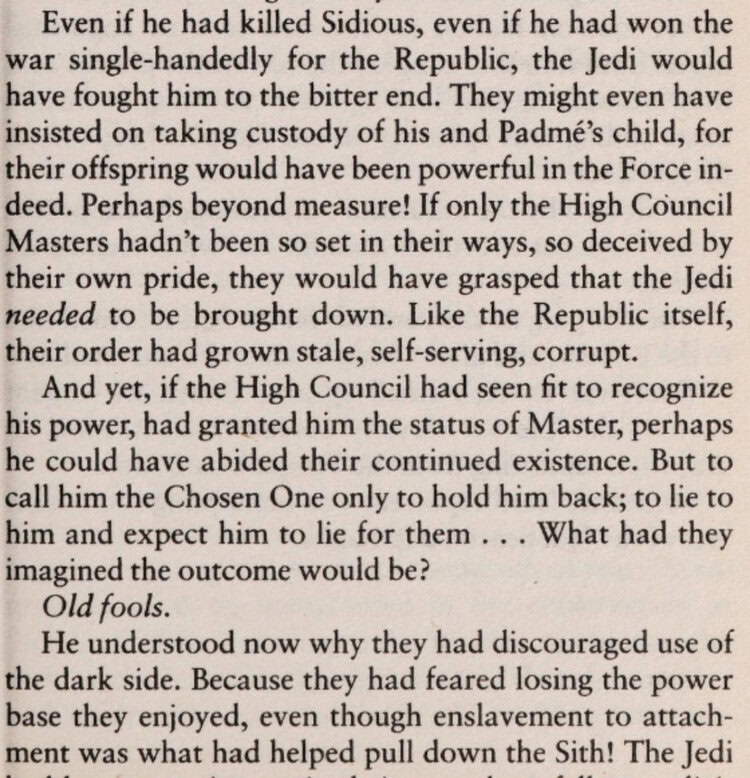Some Star Wars moments sit in the back of your mind and never really go away. One of those moments links straight to Anakin’s fall and his first hours as Darth Vader with the unlucky younnglings. In Dark Lord: The Rise of Darth Vader (Legends), we actually get to see what was going on inside his head around that time, and I want to walk through that with you.
The Night Of Order 66 And The Temple Assault
In Dark Lord, Vader looks back on the attack on the Jedi Temple after some weeks have passed. His memory of that night comes in sharp pieces. The book describes how, “In his mind’s eye Vader saw his and the 501st’s march to the Temple gates, their wrathful attack, the mad moments of bloodlust, the dark side unleashed in all its crimson fury.”
He remembers the clones at his back, the entry through the great doors, and the chaos inside. Some scenes stand out more than others. He recalls “pitting his blade against that of swordmaster Cin Drallig, beheading some of the very Masters who had instructed him in the ways of the Force, and, of course, his cold extermination of the younglings, and with them the future of the Jedi order.”
Walking Toward The Children: Doubt And The New Dark Side
The book also shows that Anakin did not walk into that room without hesitation. As Vader remembers it, “He had wondered beforehand: could he do it? Still new to the dark side, would he be able to call on its power to guide his hand and lightsaber?”
I like this part because it shows how unstable he still feels. He is already Darth Vader in name, but the dark side still feels new and strange to him. He is not sure he can lean on it when the moment comes. While he is marching through the Temple toward the chamber where the children are hiding, he worries about whether his resolve will hold when he actually sees them.
These doubts are important for everything that comes next. He knows the younglings personally. Many of them look up to him. He has trained Padawans, walked the halls as a Knight, and lived around Temple children for years. The idea of raising a lightsaber against them brings real conflict inside him, and Dark Lord makes that very clear before anything else happens.
According to the novel, this is the moment when the dark side steps in with a very specific answer. While Anakin questions himself, “the dark side had whispered: They are orphans. They are without family or friends. There is nothing that can be done with them. They are better off dead.”
From that one whispered line, you can see how his thinking changes:
- The younglings become “orphans” in his mind.
- They are “without family or friends.”
- “There is nothing that can be done with them.”
- “They are better off dead.”
He moves from worrying about whether he can kill them to seeing their deaths as the only outcome left. The dark side gives him a story where the slaughter looks like a kind of mercy.
As he walks, he tells himself that no one outside the Order will protect these children once the Jedi fall. Their futures, in his view at that moment, hold only fear, rejection, or worse. The dark side uses that fear to comfort him. It tells him he is not just allowed to act; he is doing them a favor by ending their lives quickly.
When Anakin finally reaches the younglings, the movie gives us only a short scene. A small boy steps forward and says, “Master Skywalker, there are too many of them. What are we going to do?” Then the blue blade ignites.
The story in Dark Lord jumps forward. Darth Vader, in full armor, serves the Emperor and hunts surviving Jedi. During this period, the memory of the Temple attack comes back to him in detail. The book says, “But this recalling, weeks later, curdled his blood.”
So even after time has passed, the memory hits him hard. Right after that line, he thinks, “This place should never have been built!”
Instead of focusing on his own role, he turns his attention to the Temple itself and what it stood for. In his head, the Temple and the Jedi Order created a system that brought those children there, trained them, and set up the situation that led to their deaths. When his blood “curdles,” he reacts by rejecting the place rather than sitting with personal guilt.

Mustafar In His Memory: Padmé, Obi-Wan, And Feeling Unheard
From that point, his thoughts slide straight from the Temple to Mustafar. The novel describes his view of Padmé’s reaction: “Oh, but on Mustafar she had worked herself into a state over what he had done at the Temple, so much so that she hadn’t heard a word he was saying. Instead she had made up her mind that he had come to care more about power than he cared for her.”
In his mind, her judgment is unfair. He thinks, “As if one matters without the other!” For him, power and his love for her connect in a single goal: protect her and their child.
Then his memories bring in Obi-Wan: “And then cursed Obi-Wan had shown himself, interrupting before Anakin could explain fully that everything he had done, in Palpatine’s office and at the Temple, had all been for her sake, and for the sake of their unborn child. Had Obi-Wan not arrived he would have persuaded her to understand—he would have made her understand—and, together, they would have moved against the Sith Lord . . .”
The text then returns to the present moment in his armor: “The rasp of Vader’s breathing became more audible.” His anger rises, and the body language shows it: “Flexing his artificial hands did nothing to waylay his rage, so he hunched his broad shoulders under the armor pectoral and heavy cloak, shuddering.”
Finally his thoughts settle into one raw line: “Why didn’t she listen to me? Why didn’t any of them listen to me?”
So in his own replay of events, the pain from the Temple and the collapse of his life with Padmé blend into a single feeling that no one trusted him or heard him out.

How He Reframes The Jedi Council And The War
Right after that, Dark Lord shows how his mind shifts toward the Jedi Council. He goes into a long “what if” line of thought: “Even if he had killed Sidious, even if he had won the war single-handedly for the Republic, they would have fought him to the bitter end. They might even have insisted on taking custody of his and Padmé’s child, for their offspring would have been powerful in the Force indeed. Perhaps beyond measure!”
He then focuses on the Council Masters: “If only the High Council Masters hadn’t been so set in their ways, so deceived by their own pride, they would have grasped that the Jedi needed to be brought down. Like the Republic itself, their order had grown stale, self-serving, corrupt.”
From his view, they failed to see what needed to happen. The same memory that includes the younglings’ deaths also feeds his belief that the Jedi Order had become “stale, self-serving, corrupt.”
He still leaves room for another path, though. The book continues: “And yet, if the High Council had seen fit to recognize his power, had granted him the status of Master, perhaps he could have abided their continued existence. But to call him the Chosen One only to hold him back; to lie to him and expect him to lie for them . . . What had they imagined the outcome would be?”
His answer to his own question comes in one short judgment: “Old fools.”

The last part ties this directly into his view of the Force: “He understood now why they had discouraged use of the dark side. Because they had feared losing the power base they enjoyed, even though enslavement to attachment was what had helped pull down the Sith!”
From his perspective here, the Jedi warned against the dark side because they wanted to protect their own position. He sees their teaching about attachment and emotion as part of the problem rather than a safeguard.

